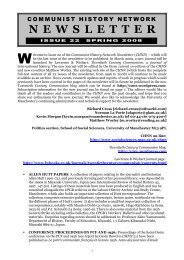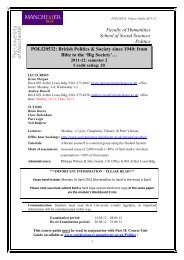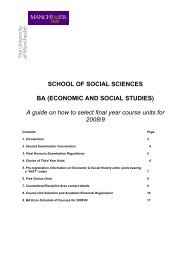second year course outlines 2012-2013 - School of Social Sciences ...
second year course outlines 2012-2013 - School of Social Sciences ...
second year course outlines 2012-2013 - School of Social Sciences ...
Create successful ePaper yourself
Turn your PDF publications into a flip-book with our unique Google optimized e-Paper software.
Examination period: Monday 14 th January <strong>2013</strong> – Friday 25 th January <strong>2013</strong><br />
Re-sit Examination period: Monday 19 th August <strong>2013</strong> – Friday 31 st August <strong>2013</strong><br />
Please read this <strong>course</strong> outline through very carefully as it provides essential information<br />
needed by all students attending this <strong>course</strong><br />
This <strong>course</strong> guide should be read in conjunction with the Philosophy Study Guide.<br />
Copies may be obtained from the Undergraduate Office, G.001 Arthur Lewis Building or from<br />
the SoSS intranet at: http://www.socialsciences.manchester.ac.uk/intranet/ug/handbooks/<br />
2. ABOUT THE COURSE<br />
Summary<br />
This <strong>course</strong> unit is concerned with central questions in analytical aesthetics: questions in<br />
areas (e.g. the philosophy <strong>of</strong> mind, ontology and the philosophy <strong>of</strong> language) that are<br />
themselves at the core <strong>of</strong> analytical philosophy. Topics covered include: what is an artwork?;<br />
are there correct and incorrect evaluations <strong>of</strong> works <strong>of</strong> art?; what is involved in interpreting a<br />
work <strong>of</strong> art?; what, if anything, is wrong with forgery?; how can works <strong>of</strong> music express<br />
emotions?; is cinema a particularly realistic art form and, if so, in what does its realism<br />
consist?<br />
Aims<br />
This <strong>course</strong> unit aims to:<br />
• Enable students to analyse and develop their own reasoned opinions on some <strong>of</strong> the most<br />
central and enduring problems in analytical aesthetics.<br />
• Enhance students' powers <strong>of</strong> critical analysis, reasoning and independent thought.<br />
• Familiarise students with some <strong>of</strong> the most interesting and provocative texts in analytical<br />
aesthetics<br />
Learning Outcomes<br />
On successful completion <strong>of</strong> this <strong>course</strong> unit, students will be able to demonstrate:<br />
• Knowledge and understanding <strong>of</strong> a range <strong>of</strong> central texts in analytic aesthetics.<br />
• Some in-depth critical knowledge <strong>of</strong> some <strong>of</strong> the most important theories in the areas<br />
covered by the <strong>course</strong>.<br />
• The ability to critically reflect on those theories, and to articulate and defend their own<br />
views.<br />
64

















